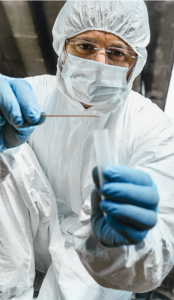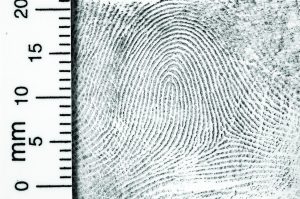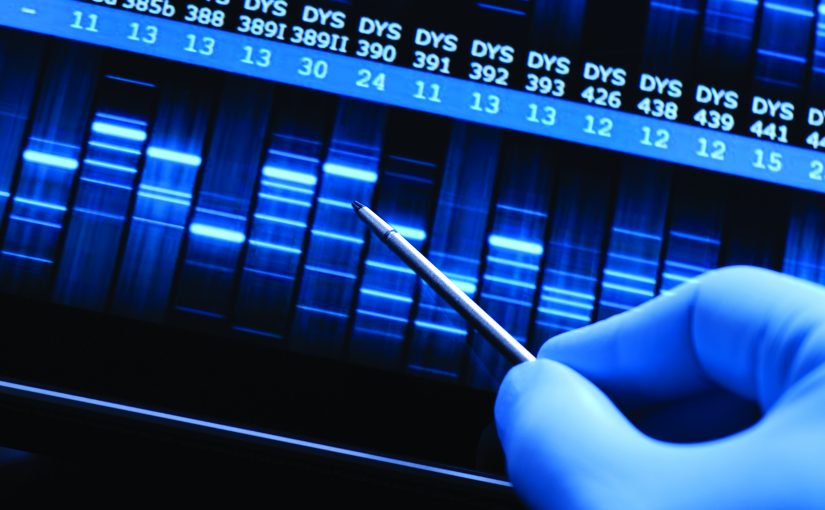Crime labs, also known as forensic science service providers (FSSPs), work with law enforcement to investigate crime scenes and collect evidence for investigations. They conduct testing on everything from fingerprints and DNA to gunshot residue while helping to maintain the integrity of the investigation through meticulous documentation and proper chain-of-custody procedures. In the United States, the community of crime labs is diverse, including public laboratories and forensic units, medical examiner and coroner offices, private labs, individual practitioners, academics, and consultants.
How can one know if a crime lab is performing well? Accreditation—the recognition of technical competence through an independent, third-party assessment of lab quality and administrative and technical systems—offers a way to identify a lab’s conformance with established standards, and it conveys an expectation of excellence. Accreditation differs from certification in that it applies to the laboratory rather than the credentials of any one individual. Approximately 88 percent of U.S. crime labs have been granted accreditation, most commonly by one of the two largest forensic accreditation bodies: the American National Standards Institute National Accreditation Board and the American Association for Laboratory Accreditation. Many of the remaining 12 percent of crime labs are run by local law enforcement.
Here to Help—The ASCLD Accreditation Initiative
In 2019, the American Society of Crime Lab Directors (ASCLD) and the Forensic Technology Center of Excellence at RTI International (RTI) launched the ASCLD Accreditation Initiative, which provides training and technical assistance to crime laboratories seeking accreditation.
The program evaluates the expertise of lab directors, quality assurance managers, and technical subject matter experts who then mentor FSSPs committed to achieving accreditation within an 18-month time frame. Mentors help labs with any adjustments they may require because of the accreditation process, which includes evaluations of the crime laboratory’s policies, procedures, personnel qualifications, equipment, and quality control measures. John Byrd, executive director of ASCLD, described the initiative as a bridging strategy to help agencies that want or need to become accredited. Obtaining a certificate of accreditation means that a lab has proven its commitment to recognized quality management principles such as documented training, systematic review, and corrective action. These principles not only lead to improvements in forensic services but also enhance the health of the entire organization over time.
Creating Accreditation Documentation
International standards are used to evaluate compliance. From an organizational perspective, each standard has an infrastructure that surrounds it, including training, documentation, and quality management. These elements are interpretable, which is why it is so important for crime labs to create their own documents for compliance.
Although it may be tempting for labs to acquire and modify protocols from previously accredited labs, labs must create their own accreditation documentation based on their unique equipment and operating procedures. Put simply, accreditation ensures that a lab clearly states what it does and establishes that the lab actually does it; the ASCLD Accreditation Initiative helps labs achieve this goal.
Accreditation for Smaller Labs
Crime lab accreditation is available to both public and private labs as well as law enforcement agencies that manage lab services in-house. However, it requires dedication, time, and possibly even financial investment, and the latter two are often scarce for smaller agencies.
Both large and small law enforcement–run crime labs view the process of accreditation with trepidation because they believe that only enormous laboratories receive accreditation. In addition, many state and local law enforcement agencies face staffing challenges. For agencies with fewer than 50 employees, initiating the accreditation process can be daunting. Police officers are often the ones who collect and process crime scene evidence, and these smaller agencies need to take time from casework to work on accreditation. This could cause stress and, at least initially, result in an increased backlog due to the effort. However, the long-term benefits of accreditation may far outweigh the initial burden.
Becoming accredited can happen for labs with finite resources, and, with the help of the ASCLD Initiative, the process does not have to be difficult. Labs should understand what accreditation is, how they can meet the standards, and be open to both cultural and organizational change.
Quality Bolsters Law Enforcement and Criminal Justice

Although gaining accreditation can be difficult for some labs, the benefits are numerous. Accreditation equates to increased quality control, accountability, and public trust in both the individual lab and the criminal justice system writ large. High-functioning crime labs can improve case closure rates, reduce backlogs, decrease incidents that have an impact on prosecutions, and reinforce public safety.
Crime labs function best when they ensure high-quality, repeatable, reliable, and scientifically valid work, all while reducing unnecessary costs and fostering professional partnerships. For evidence to hold up in court, labs or forensic units need to properly train their officers or civilians to handle that evidence and perform tests in various forensic disciplines. Doing the job right the first time saves crime labs money in the long run.
Accreditation adds value to FSSPs by
- ensuring technical competence through independent review of quality management;
- signaling commitment to upholding the highest possible international standards;
- creating a risk management system for evaluation and improvement of policies and procedures; and
- fostering professional partnerships in the field and building a network of support.
The Process of Crime Lab Accreditation
Accreditation of a crime lab or a forensics unit is a multistep process that requires dedication and resources. Forensic science accrediting bodies in the United States use the International Organization for Standardization (ISO) and require FSSPs to follow ISO/International Electrotechnical Commission standards along with additional, forensic science–specific criteria.
Adhering to these requirements shows that the crime lab has successfully completed a rigorous assessment by an accrediting body and provided objective evidence to demonstrate conformance. For example, to achieve and sustain accreditation, crime labs must perform the following tasks:
- Develop a manual that thoroughly describes the lab’s quality management system.
- Document policies and procedures.
- Assess the technical competence of their analysts.
Police-Run Crime Lab Achievements
To date, 10 police-run crime labs have achieved accreditation through the ASCLD Initiative in disciplines such as latent prints, crime scene investigation, firearms and toolmarks, serial number restoration, digital and video imaging technology and analysis, and body fluid identification. These success stories include police labs in Boise, Idaho, and Salt Lake City, Utah.
Boise Police Department Crime Lab
The Boise Police Department (BPD) Crime Lab, a local police department–run lab in Boise, Idaho, achieved accreditation in body fluid identification and crime scene investigation with the help of the ASCLD Initiative in 2022. They were also accredited in the discipline of latent prints, including latent print processing and comparison.
 The lab found the ASCLD team to be an invaluable resource. The team allowed the lab access to mentors’ experience and examples of policies and procedures, which helped the lab adhere to their timeline. The BPD’s accreditation was both worthwhile and achievable because of the ASCLD team’s support, feedback, and resources.
The lab found the ASCLD team to be an invaluable resource. The team allowed the lab access to mentors’ experience and examples of policies and procedures, which helped the lab adhere to their timeline. The BPD’s accreditation was both worthwhile and achievable because of the ASCLD team’s support, feedback, and resources.
“The work done by our lab is an important part of the criminal justice system, and we have worked hard to reach and maintain these strict standards,” said Crime Lab Supervisor Jennifer Delaney.1
When we testify in court, accreditation shows we are operating on the same high-level playing field as other forensic experts. Accreditation gives our community the assurance and peace of mind that they can trust our results.
Salt Lake City Police Department Crime Lab
The Salt Lake City Police Department (SLCPD) Crime Lab, based in Salt Lake City, Utah, achieved accreditation in 2021 with the help of the ASCLD Initiative. The lab received accreditation in firearms and toolmarks, which includes weapon function evaluation, physical comparison, qualitative determination, and serial number restoration. They additionally received accreditation in friction ridge (finger and palm prints), which includes enhancement, database searching, and physical comparison, and in crime scene investigation, which includes field sampling, enhancement, and qualitative determination.
One officer from SLCPD said,
Achieving this accreditation should give our community the confidence that the procedures used to examine every item inspected by the Salt Lake City Police Department Crime Lab meet the highest of international standards and represent their commitment to quality and continuous improvement.2
Ensure Success
Although at least 10 states have passed legislation that mandates crime lab accreditation, many jurisdictions have not. This is likely one of the reasons why many labs are not incentivized to adopt international standards and apply for accreditation. The ASCLD Accreditation Initiative has proven to be a success, and the team would like to support more labs, especially small labs run by local law enforcement.
|
Resource To learn more about this program, visit the ASCLD Initiative website online.
|
Accreditation involves many moving parts and requires personnel to champion the process and meet specific milestones. Building an accreditation team can help engage personnel and leverage members’ unique expertise. Feedback from mentors and quality managers suggests that educating lab members on the benefits of crime lab accreditation helps the process be more positive and effective in the long run. d
Notes:
1City of Boise, “BPD Crime Lab Receives International Accreditation,” press release, June 10, 2022.
2“SLCPD Crime Lab Receives National Accreditation,” Gephardt Daily, July 29. 2021.
Please cite as
Lucas Zarwell, John Grassel, and Maya Metni Pilkington, “Police Crime Lab Accreditation Initiative,” Police Chief Online, January 31, 2024.



